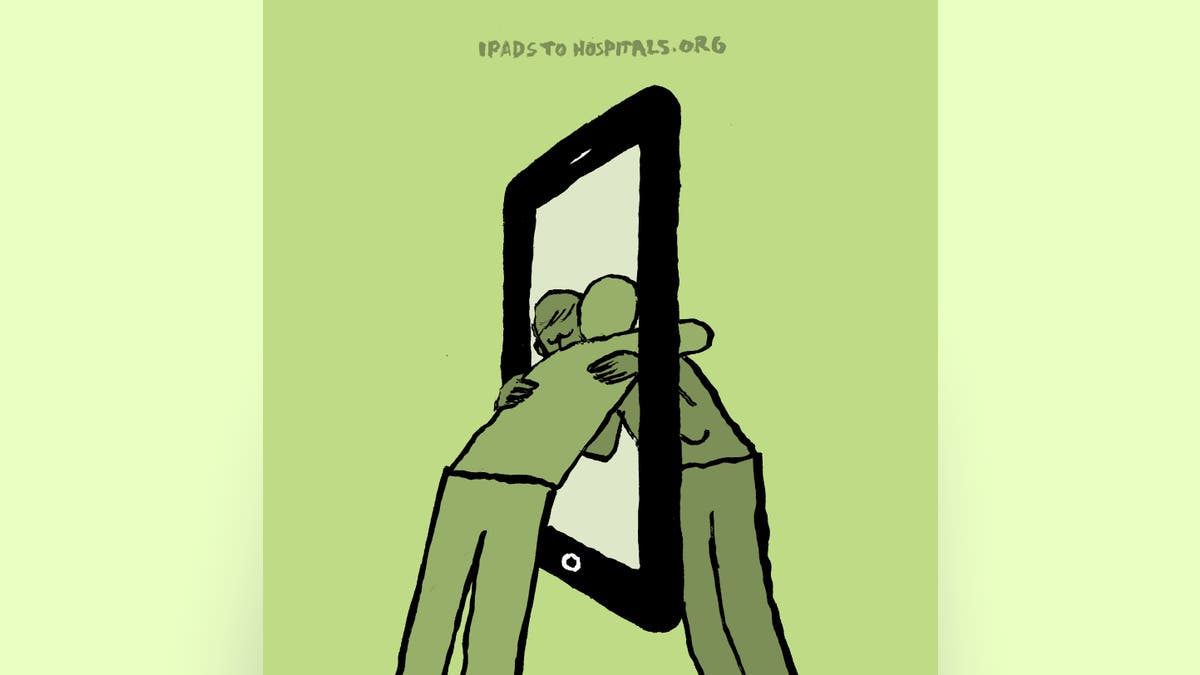
This illustration by French artist Jean Jullien, released by Jullien to Fox News, was created to spotlight the work of iPads to Hospitals, a volunteer group that collects used tablets and donates them to hospitals and nursing homes in underserved communities. (Jean Jullien)
Hours after the 2015 terror attacks in Paris, French illustrator Jean Jullien spontaneously took to his sketchbook with simple brush strokes of ink to create a peace symbol with the Eiffel tower – known as “Peace for Paris” – which quickly became an iconic image of the world’s solidarity with France.
His latest work is equally powerful.
In a minimalist black-and-green illustration, the artist captures two people embracing through the frame of an iPad, a device that has become the new doorway to communication during the deadly COVID-19 pandemic.
The 37-year-old Jullien created the image to spotlight the work of iPads to Hospitals, a New York-based volunteer group that is collecting used iPads and donating them to hospitals and nursing homes in underserved communities – allowing those in isolation to connect with loved ones.
“My idea was to focus on the embrace, the warmth of bringing people closer,” Jullien said of his work, released exclusively to Fox News.
“The tablet has become a digital gateway, a frame for this moment,” he said in an email.
The effort by the group – founded by Amy Johnson and Jeff Arace, medical students at SUNY Downstate in Brooklyn – is making an impact. iPads to Hospitals has so far received 1,000 used tablets from 35 states and has nearly reached its $50,000 fundraising goal. The organization, which Fox News profiled last month, is now expanding its reach from hospitals to nursing homes, enabling the elderly to virtually connect with family members who are restricted from visiting due to the outbreak.
“The elderly are a population susceptible to infection, so many homes have strict visitor restrictions, while individuals in hospice care and long-term rehabilitation hospitals have chronic or terminal illnesses that prevent them from being able to leave the medical care setting,” said Shenara Musthaq, a 26-year-old medical student at SUNY Downstate and one of the group’s volunteers.
“Unfortunately, these are individuals that remain at a higher risk of infection than the general population so we hope to provide a stronger means of communication with loved ones until the safety measures are in place for in-person visits,” Musthaq said.
“They stepped into a void that none of us knew even existed"
As soon as used iPads are received by mail, volunteers, like 29-year-old Ian Kaplan, work to ensure the devices are properly reset and fit for donation. Sometimes the tablets arrive with handwritten notes, which exemplify the humanity of everyday Americans wanting to help from the confines of their homes.
One woman from Los Angeles wrote about her father, who died from lung disease last July after falling ill in 2017 and spending months in a hospital – living longer than doctors expected.
“This iPad was a hand-me-down given to me with love by my late father,” she wrote.
“My family and I were very privileged to spend every day by his side. I believe that it made all the difference … My heart is breaking for patients and loved ones who cannot be together right now. My prayer is that even one more family might be able to beat the odds – and this will provide some comfort during dark times,” she said.
“It’s not every day that someone receives a handwritten letter in the mail anymore,” Kaplan said of the notes he finds tucked away in boxes and wrapped around devices, some written by children.
“The letters we received have just been incredibly powerful and touching. Some have brought me closer to the hearts of the donors writing them, as they share the deeply impactful stories behind their own personal motivation to get involved in our cause,” he said.

Medical staff at Bronx HealthCare System are seen holding iPads that were donated to the hospital by the volunteer group, iPads to Hospitals. (Bronx HealthCare System)
Hospitals receiving the used iPads from across the five boroughs of New York include Jacobi Medical Center, New York-Presbyterian Brooklyn Methodist Hospital, Calvary Hospital and Maimonides Medical Center.
Dr. Douglas Reich, chairman of Family Medicine at Bronx HealthCare System, which received another batch of iPads from the group on Friday, described the impact of the donations as “event changing.”
“They stepped into a void that none of us knew even existed,” Reich said of the group and its focus on the critical use of iPads during the pandemic.
Reich said the hospital’s IT department worked from the beginning of the outbreak to use technology as a way to connect families with COVID-19 patients isolated in their rooms.
“We had a limited numbers of iPads within our own institution. We’d have a patient’s family member arrive and we’d give them an iPad in the lobby and then run upstairs to give one to the patient. It was somewhat cumbersome,” he said.
“The help from this group has now made it so much more efficient and has streamlined the process,” Reich said. “We’re now connecting 50 to 75 patients a day with iPads. So many more people are able to communicate with their family members.”
Reich recounted one day in late afternoon when a COVID patient, speaking in Spanish, told him he had not seen or heard from anyone since doctors attended to him that morning. Reich promptly grabbed an iPad and dialed up the patient’s wife and three daughters, who were able to FaceTime with their father from his hospital bed.
“It was a beautiful moment to witness,” he said. “At the end of it, one of my colleagues called back the family to ask if they had any questions or concerns and they were sobbing on the other end of the phone.”
“They were so grateful for the experience to be able to see their dad,” he said.
